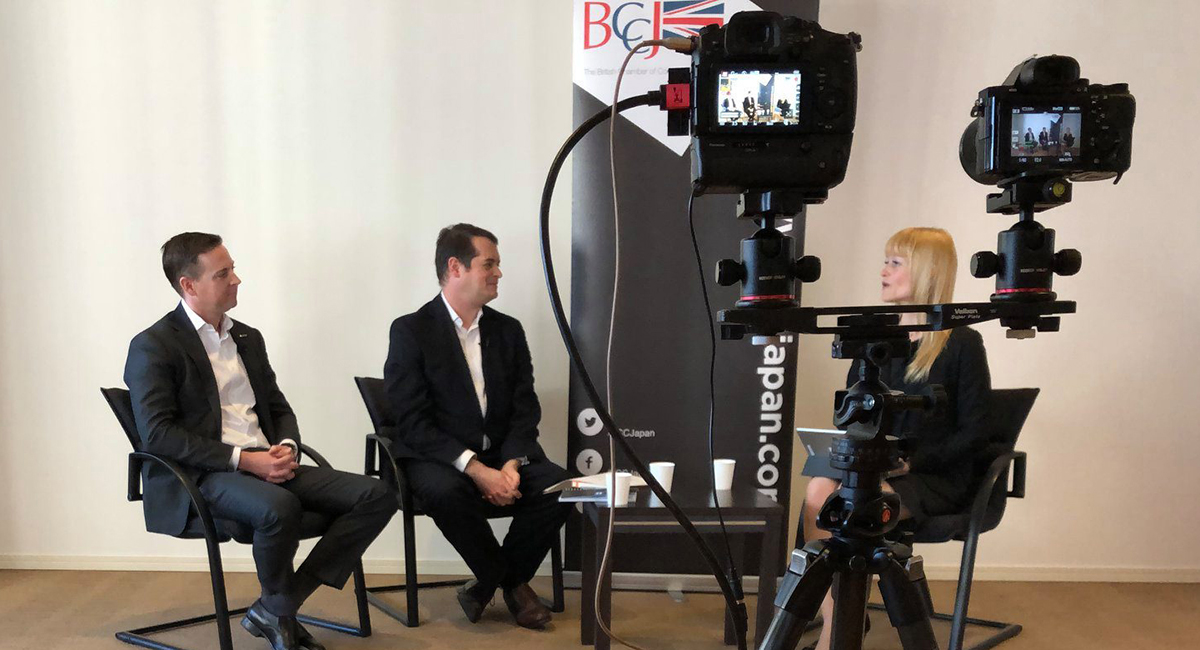Securing employee safety, quickly adapting to a changing situation and planning how to operate in a very uncertain future. These are the challenges presented by the Covid-19 outbreak, according to Jaguar Land Rover Japan Chief Executive Magnus Hansson. He told ACUMEN  that, in the face of the rapidly expanding coronavirus pandemic, it is critical to take extra time to listen to staff, who have real concerns about multiple things now—private and business—and need leaders who have the empathy to understand and support them.
that, in the face of the rapidly expanding coronavirus pandemic, it is critical to take extra time to listen to staff, who have real concerns about multiple things now—private and business—and need leaders who have the empathy to understand and support them.
With that in mind, as face-to-face gatherings have been largely taken off the table, the British Chamber of Commerce in Japan (BCCJ) has begun a series of digital events and initiatives, including webinars, podcasts and interactive Q&As.

From left: Jeremy Sampson, Jonathan Spraggs and Heather McLeish
At the heart of the discussion is business continuity. How can firms continue to operate with minimal disruption under the extreme measures being taken to contain the spread of the virus? How can they weather the economic storm that has rocked markets around the world?
Challenges and response
The rapid dispersion of Covid-19 from its point of origin in Wuhan, China, to the rest of the world has left governments and businesses with little time to react. Big decisions have been thrust upon us, and knowing what to do can be difficult—even if your organisation had a contingency plan.
At the BCCJ’s first webinar on 16 March, entitled Covid-19: The Leadership Challenge, GlaxoSmithKline K.K. (GSK) Vice President and International Head of Tech Jonathan Spraggs and Robert Walters Managing Director of Japan & Korea Jeremy Sampson tackled issues of business continuity in a session moderated by EY Japan Director and BCCJ Executive Committee (Excom) member Heather McLeish.
With what was initially a health risk becoming a financial risk, the scramble to protect staff, families and the viability of business, how do leaders rise to the challenge? What best practices can see you through the danger?
“It is time to lead with agility,” Spraggs said. “You have to give some confidence in your leadership, but you’ve also got to have some humility. No one expects that we’re computers that know everything.
“We’re doing our best to operate as normally as we possibly can. As a pharma company, people rely on our medicines to stay well, doctors rely on being able to access us to get the right information to treat their patients. As much as possible, we’re trying to operate as normally as we can to ensure business as usual and that patients can access medicines. So, our offices are in a situation where they’re not actually closed, but we’re advising people to work from home as much as possible”.
Sampson said that Robert Walters has been doing much the same. “We’re strongly encouraging all of our employees to work from home. One of the things that was the most important for us, when we decided to make the decision, was to ensure that we could provide seamless service to our clients and candidates. We didn’t want any client or candidate to get the impression that we we weren’t working as per usual. Thankfully, I think we’ve been able to achieve that to a really large degree”.
 Beyond the webinar, ACUMEN spoke with other leaders to find out how smaller firms are reacting. Robert Heldt, president and co-founder of Custom Media KK, publisher of ACUMEN, said: “The main priority by far for firms and leaders should be the safety, comfort and peace of mind of staff, clients and other stakeholders. It is critical to keep strong communication channels open and provide regular updates, support, encouragement and understanding”.
Beyond the webinar, ACUMEN spoke with other leaders to find out how smaller firms are reacting. Robert Heldt, president and co-founder of Custom Media KK, publisher of ACUMEN, said: “The main priority by far for firms and leaders should be the safety, comfort and peace of mind of staff, clients and other stakeholders. It is critical to keep strong communication channels open and provide regular updates, support, encouragement and understanding”.
Dr Greg Story, president of Dale Carnegie Training Japan K.K., echoed this and the initial reactions of Spraggs and Sampson. “Protecting the staff’s health is the number-one priority, so that means moving work to home to enable people to isolate themselves from the virus”.

Dr Greg Story presenting at a BCCJ session.
Shift to home
Prior to the coronavirus outbreak, working from home was already a hot topic in Japan, a country that trails far behind the UK and many others in this area. But it was being treated as a nicety, something that might help alleviate transit congestion during the Tokyo 2020 Olympic and Paralympic Games. With a recent Reuters poll finding that 83% of Japanese firms have no remote work options in place—and 73% saying they were not planning to offer the option even during the Games, despite the government’s request—Covid-19 has pushed many to quickly implement a work style they have been heavily resisting.
But not everyone has such reservations. BCCJ member firms such as GSK and EY Japan have had systems in place for years, making adaptation to the present crisis easier. Others already rely on remote working as their primary mode of operation.
 Tove Kinooka, a BCCJ Excom member who also leads the chamber’s Responsible Business Task Force, is one such person. Her firm, Global Perspectives K.K., has a small core team of four people.
Tove Kinooka, a BCCJ Excom member who also leads the chamber’s Responsible Business Task Force, is one such person. Her firm, Global Perspectives K.K., has a small core team of four people.
“We have always worked from home, so staying engaged and connected with internal work projects and people has not been an issue,” she explained. “Our biggest concern has been how to maintain work–life balance. For my co-founder and myself, particularly, our business is our passion, so switching off—mentally and literally—when the computer is constantly near to hand has always been a challenge”.
At Jaguar Land Rover, Hansson said unlimited work from home was immediately offered to everyone “to save them time and exposure, and liberate them to find the best way to balance their lives and yet deliver in their jobs”. The firm already had work from home policies and the necessary technology enabled for several years.
Best laid plans
GSK was also tech-ready. “Pretty much everything we do could be done remotely where technology is required,” Spraggs said. “And, with the Olympics coming up, we’ve been preparing for the past year and a half. We actually ran a couple of simulations where we asked everybody to work from home for a day. And we did that a couple of times. The idea was, we do that during the Olympic period. Certainly that aided our planning for this scenario”.
But even with such planning, nothing’s perfect, he added. “You can never predict the exact crisis you are going to have. There are some adjustments we need to make along the way, but we’ve got a pretty solid plan in place and, so far, it’s working extremely well”.
Robert Walters, meanwhile, faced a scenario being played out in a majority of firms. Sampson and his team had to take quick action and learn on the fly. “We didn’t have any current work-from-home initiatives or setup in place at all—except for, of course, case-by-case scenarios with working parents, working mothers and situations like that,” he explained. “But, thankfully, we had the technology, which we brought out in the past 18 months or so. Everybody has full remote capabilities, but we were still in early stages of discussion, in terms of remote working and smart working. We hadn’t taken the plunge just yet”.
This means that the firm—like most—had to take the plunge in a very short time. Sampson said that the trigger point for Robert Walters was when the government came out on 25 February and said they strongly recommended teleworking.
“From the following day, we had everybody working from home. We have probably about 10% coming into the office. But, I think what we were able to achieve is what would have probably taken six months of small-scale trials, workshops, discussion and debate. We were able to achieve it in about a week or so”.
Being productive
With this forced shift to teleworking comes concern over collaboration and productivity.
As someone for whom working from home was already the norm, Kinooka gave ACUMEN two tips for those diving into the water for the first time.
“Regular, short team check-ins are useful for maintaining a sense of structure to the day and for keeping up to date on progress. We do them most mornings,” she said.
“Video is always preferable to just audio, and definitely better than an email or text message. It is much easier to feel connected when you can see who you’re talking to, and video is particularly helpful for multicultural teams to avoid the misunderstandings that can occur when you’re relying only on spoken communication in a second or third language”.
Sampson said that Robert Walters is also making morning check-ins part of their process. “We start every morning—every team—with an 8:45 meeting, and that continues every single day. It is the morning team review session, and we just do that by Skype.
“The other best practice that we’ve implemented is that, by default, all calls will be video calls. That just ensures there’s more face-to-face interaction and more engagement”.
While staff might be working remotely, it’s still business as usual, he said, so you go through the same process and you insist on the same standards that you would in the office.
On that point, Spraggs shared a personal strategy that keeps him locked into his normal routine.
“I walk to work. If I’m working at home, I still do that walk. I’m not actually walking to work, but I try and keep that routine,” he explained. “I get up, I do that walk. That’s when I do my mental preparation, actually, whether I’m going to the office or whether I’m going to work from home. I keep that going and keep having those same connection points”.
Keeping a routine and maintaining contact with colleagues—especially through video—can go a long way towards alleviating what Story warns of when working from home: a feeling of isolation. “We need to make opportunities to meet online with the same cadence as we usually would. Hold regular online meetings, have everyone set clear goals and priorities, hold people accountable for delivering them, be supportive of the changed conditions and have people work in teams rather than on their own whenever possible”.
Staying alive
Covid-19 poses a threat not only to the health of people but also to business. As of 21 March, the FTSE100 had lost 25% of its value, the US stock market had shed 35%—falling at a rate faster than during the Wall Street crash of 1929 that led to the Great Depression—and the Nikkei 225 was down 29%. This sudden economic downturn—triggered largely by the extreme measures being ordered to slow the spread of the coronavirus—has sent shockwaves through the business world. How can you give your firm the best chance of surviving?
“Especially in such uncertain times, it is crucial for firms to be innovative, resilient and carefully consider the implications of their business health, relationships and communications with their clients, partners and stakeholders,” said Heldt.
“Business confidence is often first to feel the heat, with the domino effect from large organisations cutting spend trickling down to small and medium-size enterprises that rely on them for regular revenues; this is counter-productive. Many large organisations in Japan are cash-rich, so this is a rare opportunity for them to look at innovative ways to support the economy, convey their messages and prepare for the eventual and inevitable return to normality instead of cutting HR or marketing spend,” he added. “Throughout history, we have seen how innovative, agile and competitive firms get it right during both difficult and easy times. They capture market share and are best placed to capitalise on the eventual rebound and beyond”.
Story and Kinooka are both turning the forced change into an opportunity to innovate and position their firms to better serve customers. Dale Carnegie and Global Perspectives have a similar problem: both provide in-person training, something not possible now that social distancing is imperative.
“Classroom revenues are at zero and we are now building our online remote delivery classes,” Story said. Dale Carnegie is also rapidly developing and deploying a line-up of online training programmes, in Japanese and English, to help leaders and team members learn how to best deal with the challenges of the pandemic.
Global Perspectives is taking the same approach. Kinooka explained that, while they had discussed shifting deliver to online for years, they had always seen it as a nice-to-have rather than an essential part of their line-up. Covid-19 has changed that.
“We are now working with clients to create online versions of our offerings,” she said. “The financial return will not be immediate, but the benefit of not being able to do our face-to-face work is that we currently have time to focus on this—so it will be ready to go live very soon”.
In the meantime, firms have put the brakes on expenses as much as possible. “We have cut all unnecessary spending, we are preserving cash, we have the team understanding that there will be salary cuts once cash burns low and we have applied for government loans,” Story said.
Hansson echoed the importance of fiscal restraint. “Preserving and controlling cash—and instilling total cost discipline—is vital. But, at the same time, you must develop ideas to stimulate demand and be ready for growth again as soon as customers’ confidence returns”.
Kinooka warned not to assume things will be back to normal soon, however. “Nobody knows how long the situation will last, and even when restrictions are lifted the world will likely be very different,” she said. “We can use this time to get ready for that new normal by using the enforced change to identify what we are doing well, what we could do differently and what opportunities there are to create new business models.
“Shifting our mindset from victim mode to proactively looking for opportunities is the true meaning of resilience,” she added. “This will help us to be better prepared for situations such as this in the future”.
